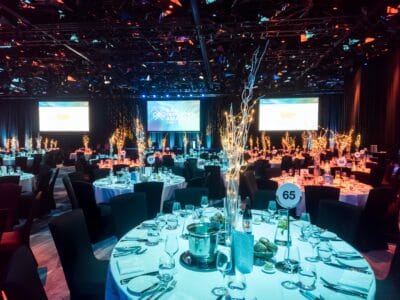Event planning is more than schedules and logistics; it is about creating experiences that connect people. An event manager’s life is filled with the art of balancing creativity, communication, and precision. From corporate celebrations to client milestones, every event begins with a vision and ends with a moment that brings people together. At the heart of it all lies one essential element: the power of connection.
An Event Manager’s Life: The Power of Event Planning

Behind every successful event is an event manager who understands that connection drives everything, between clients, teams, and guests. Event planning is not simply about managing details; it is about understanding people, anticipating needs, and crafting an atmosphere that feels both seamless and engaging. Each project tells a unique story shaped by relationships, trust, and collaboration, forming the foundation for events that leave a lasting impression.
The Art and Heart of Event Planning
Event planning is a craft that blends creativity with meticulous organisation. Every event manager knows that success lies in attention to detail and the ability to see the bigger picture. From initial consultations to final execution, the process requires a combination of imagination and discipline. When managed well, event planning transforms ideas into experiences that truly connect with audiences.
A professional event planner approaches each event as a story waiting to be told. This means understanding client goals, designing an event flow that captures emotion, and delivering a seamless guest experience. The art of event planning involves both creativity and empathy, allowing each decision to reflect the desired atmosphere and brand personality.
To master the heart of event planning, focus on:
- Listening first: Understanding client expectations and audience needs.
- Balancing logistics and aesthetics: Blending functionality with visual appeal.
- Creating emotional impact: Ensuring every element, from lighting to layout, contributes to the story.
True artistry in event planning lies not just in execution but in connection, the ability to make every guest feel part of something memorable and meaningful.
Building Lasting Connections with Clients
Strong client relationships are the cornerstone of every successful event. Event managers who invest time in understanding their clients’ values and vision can deliver results that go beyond expectations. This connection begins with genuine curiosity and consistent communication throughout the planning process.
In event planning, trust is earned through reliability and transparency. From the first consultation to the post-event wrap-up, being proactive and clear helps clients feel supported and confident. When clients know their ideas are valued, collaboration flows naturally and outcomes are stronger.
To strengthen client relationships, event managers can:
- Communicate consistently: Provide regular updates and confirm key decisions.
- Offer tailored solutions: Adapt services to suit each client’s brand or personality.
- Seek feedback: Use client input to refine future planning and enhance service quality.
Building connections with clients transforms event planning from a transactional process into a creative partnership that delivers memorable, meaningful experiences.
Team Collaboration Behind the Scenes
Every successful event is powered by teamwork. Behind the polished presentations and seamless transitions lies a dedicated network of professionals who bring the vision to life. From stylists and coordinators to suppliers and technicians, collaboration ensures each element aligns perfectly with the event plan.
Event managers act as the central link between all moving parts. They oversee communication, resolve challenges, and keep every department aligned toward a shared goal. This collaboration not only improves efficiency but also creates a sense of unity and purpose across the entire team.
Effective team collaboration in event planning includes:
- Clear communication channels: Regular updates and shared platforms for scheduling.
- Defined roles and responsibilities: Everyone knows their part and how it contributes to success.
- Mutual respect and trust: Recognising each professional’s skill set and value.
When collaboration thrives behind the scenes, the event runs smoothly on the surface. It is this invisible teamwork that transforms an ordinary event into an extraordinary experience.
The Power of Professional Networking
Networking is one of the most valuable tools in an event manager’s toolkit. Building a network of trusted suppliers, venues, and creative partners can significantly enhance the success of any event. These professional relationships form the backbone of event logistics and innovative execution, ensuring every aspect meets the highest standard.
Strong networks are built over time through professionalism, reliability, and mutual support. Event managers who maintain positive relationships with suppliers and collaborators gain access to exclusive opportunities, better rates, and insider insights. This not only benefits clients but also strengthens the reputation of the event management company.
Key benefits of professional networking:
- Access to resources: Reliable suppliers and venues create smoother event execution.
- Innovation and inspiration: Industry peers share ideas that spark creativity.
- Reputation building: Consistent professionalism leads to long-term partnerships.
In the world of event planning, professional networking is not just about connections; it is about collaboration, growth, and the shared goal of delivering exceptional event experiences.
Balancing Emotion and Execution
Successful event planning requires both emotional intelligence and technical precision. Event managers must navigate client expectations, vendor challenges, and real-time decisions while maintaining calm and confidence. Balancing emotion and execution ensures that every event not only runs smoothly but also resonates on a deeper level with those who attend.
Emotional balance allows event managers to respond effectively to challenges and support clients through stressful moments. Understanding the emotional side of events, such as the excitement of a product launch or the pride of a corporate milestone, helps planners create experiences that feel authentic and meaningful.
Key ways to balance emotion and execution:
- Stay composed under pressure: Maintain a calm and solution-focused mindset.
- Lead with empathy: Understand the emotions behind each client’s decision.
- Focus on the outcome: Keep the event’s purpose and goals front of mind.
The ability to combine emotional understanding with practical execution separates good event managers from exceptional ones. It is this balance that ensures every event feels effortless, even when the work behind the scenes is anything but.
Event Planning in Action: From Concept to Celebration
The event planning process is a journey that brings creative concepts to life through precise coordination. Each phase plays a vital role, from the spark of an idea to the final guest farewell. Event managers guide clients through each step, ensuring clarity, communication, and flawless delivery.
The planning journey begins with discovery and design. This includes identifying goals, defining the audience, and selecting a theme that aligns with the client’s vision. Once the foundation is set, logistics and supplier coordination ensure the event comes together seamlessly and within budget.
Key stages in the event planning process:
- Concept development: Translating client goals into creative direction.
- Coordination and logistics: Managing timelines, suppliers, and resources.
- Execution and evaluation: Delivering the event and reviewing outcomes for future growth.
From concept to celebration, successful event planning combines strategy with creativity, ensuring that every detail contributes to a cohesive, unforgettable experience.
The Human Connection in Corporate Events
Corporate events offer powerful opportunities to strengthen professional relationships and enhance workplace culture. Event managers play a vital role in creating these experiences by understanding how connection drives engagement and collaboration among attendees. Whether it is a conference, gala, or product launch, the key is to design moments that feel personal and purposeful.
Human connection in corporate events is not limited to networking. It is about aligning every detail, from venue design to team interaction, with the company’s values and goals. This intentional approach turns ordinary gatherings into meaningful experiences that reflect the organisation’s identity.
Ways to enhance human connection in corporate events:
- Interactive elements: Encourage audience participation through Q&A sessions, workshops, or live polls.
- Personal touches: Incorporate storytelling or custom themes that celebrate people and achievements.
- Collaborative environments: Create spaces that inspire conversation and shared experiences.
By focusing on connection, event planners transform corporate functions into dynamic events that bring people together, build loyalty, and strengthen the sense of community within an organisation.
Turning Connections into Event Success
At the heart of every memorable event is the power of connection, the genuine relationships between planners, clients, and attendees. When event managers prioritise communication, empathy, and collaboration, the results speak for themselves. Connection turns plans into experiences and transforms gatherings into stories that last.
Event success is not only measured by attendance or logistics but by the emotions people feel and the memories they take away. When guests leave inspired and clients feel valued, an event has achieved its purpose. The magic lies in the details that make people feel seen, appreciated, and connected.
To ensure long-term event success:
- Foster ongoing relationships: Stay connected with clients and suppliers after the event.
- Reflect and refine: Evaluate each event to identify wins and areas for growth.
- Celebrate your team: Recognise collaboration and effort behind every successful event.
True success in event planning comes from understanding that every connection, no matter how small, contributes to something extraordinary.
Frequently Asked Questions: Event Planning
What is the most important skill in event planning?
The most important skill in event planning is clear and confident communication. It keeps clients, suppliers, and your internal team aligned at every stage of the event. When everyone understands expectations and timelines, you reduce stress and create space for creativity and problem solving.
How do event managers build strong client relationships?
Event managers build strong client relationships by listening first, asking the right questions, and following through on what they promise. Regular updates help clients feel informed and in control, even when plans change. Over time, reliability and honesty turn a single project into a long-term partnership.
Why is teamwork essential in event planning?
Teamwork is essential in event planning because no single person can manage every detail on their own. Stylists, coordinators, suppliers, and venue staff all bring different strengths to the table. When the team communicates well and respects each other’s roles, the event feels smooth and effortless for guests and clients.
How does professional networking improve event management?
Professional networking gives event managers access to trusted suppliers, unique venues, and fresh ideas. Strong relationships often lead to better response times, flexible solutions, and little extras that elevate the event experience. Clients benefit from this network through higher quality outcomes and more creative options.
What makes corporate event planning different from private events?
Corporate event planning is closely tied to business goals, brand messaging, and stakeholder expectations. Every decision, from theme to timing, must support the organisation’s objectives and culture. While private events focus more on personal celebration, corporate events balance experience with outcomes such as engagement, recognition, or education.
How does Pink Caviar Events create memorable experiences for clients?
Pink Caviar Events creates memorable experiences by combining thoughtful event planning with genuine care for people. We take time to understand each client’s goals, brand, and audience, then design events that feel seamless and considered. By focusing on connection, detail, and atmosphere, we turn every event into a meaningful experience for guests and hosts alike.
To make your next event truly memorable, contact Pink Caviar Events on 1300 884 800, email us or book a consultation.
Stephanie Cassimatis is the founder and head stylist of Pink Caviar Events, a leading corporate event management and styling company based in Sydney, Australia. With over 20 years of experience in the industry, she has built a reputation for precision, creativity, and exceptional client service. A Certified Event Manager (CEM), Project Management Professional (PMP), and Certified Colour Consultant, Stephanie brings together strategic expertise and design sensibility to deliver events that are both seamless and visually impactful. She also shares her knowledge as a speaker and educator, empowering professionals to elevate their event design and execution.



